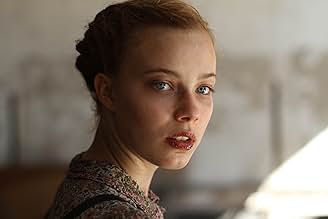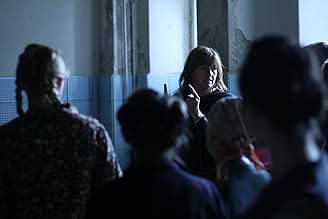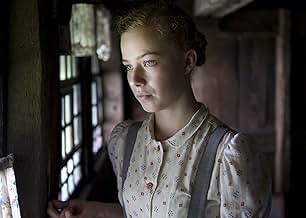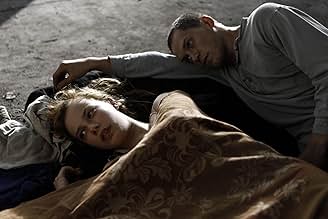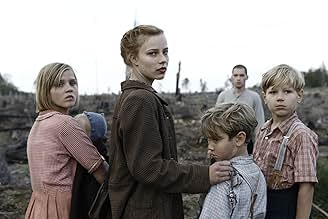Während die Alliierten Deutschland einnehmen, führt Lore ihre Geschwister auf eine Reise, die ihnen die wahren Weltanschauungen ihrer Eltern offenbart. Ein Treffen mit einem mysteriösen Flüc... Alles lesenWährend die Alliierten Deutschland einnehmen, führt Lore ihre Geschwister auf eine Reise, die ihnen die wahren Weltanschauungen ihrer Eltern offenbart. Ein Treffen mit einem mysteriösen Flüchtling zwingt Lore, einem Menschen vertrauen zu müssen, den man ihr beigebracht hatte zu h... Alles lesenWährend die Alliierten Deutschland einnehmen, führt Lore ihre Geschwister auf eine Reise, die ihnen die wahren Weltanschauungen ihrer Eltern offenbart. Ein Treffen mit einem mysteriösen Flüchtling zwingt Lore, einem Menschen vertrauen zu müssen, den man ihr beigebracht hatte zu hassen.
- Regie
- Drehbuch
- Hauptbesetzung
- Auszeichnungen
- 34 Gewinne & 34 Nominierungen insgesamt
- Thomas
- (as Kai Malina)
- Baby Peter
- (as Nick Leander Holaschke)
- Ox Cart Woman
- (as Claudia Geisler)
- School House Woman 3
- (as Hanne Wolharn)
Empfohlene Bewertungen
The ending ties it up well and puts it in proper perspective. Human perspective.
The movie, for me, is largely symbolic, archetypical. Lore is not really a person she IS the immediate post-war Germany.
Everything that she experiences, all her opinions, all the opinions she is exposed to and indoctrinated with, are the points of view of millions of the German populace.
How she deals with it, or denies it is how Germany dealt with and denied it. The 'it' being the entire ethos that permitted/enabled WWII.
In a sense all cultures are a form of mass hysteria, mass hypnotism. Societies indoctrinate as part of their nature, actually part of their definition is the values with which they indoctrinate their populace.
If the values are extreme and violent, the populace often follows. It the society fails at its aims and is physically destroyed, then the population becomes valueless and must die or reinvent itself.
Post WWI German society didn't die, so this is a movie about the pressures, the pressure cooker, in which gave birth to its reinvention.
So, as a piece of symbolic representation, it's magnificent.
There are no plot holes, every bit of dialog, every image, in necessary for understanding.
And patience is required. The viewer assembles all the images, all of Lore's perceptions.
And the pressure cooker cooks.
The film focuses on the events at the end of World War II including the death of Adolf Hitler, the tracking down of the perpetrators of the Holocaust, the aftermath of camp survivors, and the territorial carve up of Germany. A time of lawlessness, starvation and depredation.
Within this historical period the film focuses on 5 children brought up as Hitler's Youth, who are on a journey to their Aunt's. The journey brings both physical and psychological challenges along the way for the children. Lore as the eldest child takes on the responsibility of guide, provider and parent. The historical events create the incredible physical tension in the film of a fallen 'utopia' with all of its personal dangers, violence, and hardship.
Along the way they encounter Thomas, a recently released from a concentration camp. The ensuing relationship between Lore and Thomas, which is part survival, part attraction, part revulsion and part adolescent, creates the psychological tension that is at the centre of the film.
The film has echoes of the Films Downfall of the Third Reich and Zentropa in its subject material. All three films by necessity are deeply intense psychological films. The end of the world as most in Germany new it and the incredible psychological changes that the ushering of an entirely new political, social and cultural regime brings. In my world it is almost impossible to imagine, but the children that lived through this are still alive, still with us, the living memories of that period of incredible turmoil. Fertile ground for story telling and film telling about our world and our society.
Four of these children are really too young to bear any culpability. Only the oldest, Lore, is really capable of comprehension and it is through her eyes that the film is focused, as she slowly realises just how much her parents are implicated in the horrors of the Nazi regime, and, as an extension of this, herself and the whole German people. Lore is helped to this realisation by Thomas, a Jew who appears to have been liberated from a concentration camp. But Thomas also has a psychological burden and may not be all he appears.
This is another fine film from Cate Shortland, someone who surely should be making more films more often.
A gorgeous, depressing, rare film about a family of Germans who need to survive the chaos and poverty of the end of World War II. This is a really terrific movie even though it has a single, basic, ongoing, sad arc--moving from place to place in search of food and safety as the Allies, mostly unseen, take over administration of the country in 1945. What it manages to say is not just that war is bad, or that people have the ability to survive anything if they must, but that beliefs and politics are stubborn and irrational.
It's this last part that comes through it all as the shining purpose. It's one thing for this band of children to beg for food or walk though forests weary and assaulted by marauders. But to have them run into others who, like themselves, don't know where to turn or what is going on, and still have a devotion bordering on worship for the fuhrer is mind blowing. But believable.
The filming--scenes, light, color, moving camera, and the sheer range of all of these from scene to scene--is stunning, absolutely terrific. As you might grow weary of all the weariness, you never grow weary of the movie because it's so rich in other ways. And it's never dull, either, as characters come and go and their motivations turn on a dime. How it ends, both literally and emotionally, will stay a surprise, and yet when it happens it makes such perfect sad undramatic sense.
There are all kinds of war movies, and this is an important insight into one of the least explored aspects to it all--the terrible aftermath. It's an Australian production, mainly, shot in Germany in German. And it's a really special, thoughtful, beautiful film.
Wusstest du schon
- WissenswertesThe family photographs in the wallet that Lore looks at are pictures of director Cate Shortland's husband's family.
- PatzerThe derelict tank the children pass in the forest is a post-WW2 manufactured Russian T-54/55 or T-62 tank. The balk cross painted on the turret is indicative of an early war paint scheme. Later in the war the 'lines' were thicker.
- VerbindungenFeatured in Film '72: Folge vom 13. Februar 2013 (2013)
- SoundtracksJugend will marschieren
(Alte Aufnahme)
Folksong
Arranged by Lisa Carlyna Zumpano (ASCAP)
Published by Audiosparx (ASCAP)
Top-Auswahl
- How long is Lore?Powered by Alexa
Details
Box Office
- Budget
- 4.300.000 € (geschätzt)
- Bruttoertrag in den USA und Kanada
- 970.325 $
- Eröffnungswochenende in den USA und in Kanada
- 31.498 $
- 10. Feb. 2013
- Weltweiter Bruttoertrag
- 2.362.019 $
- Laufzeit
- 1 Std. 49 Min.(109 min)
- Farbe
- Sound-Mix
- Seitenverhältnis
- 1.85 : 1



